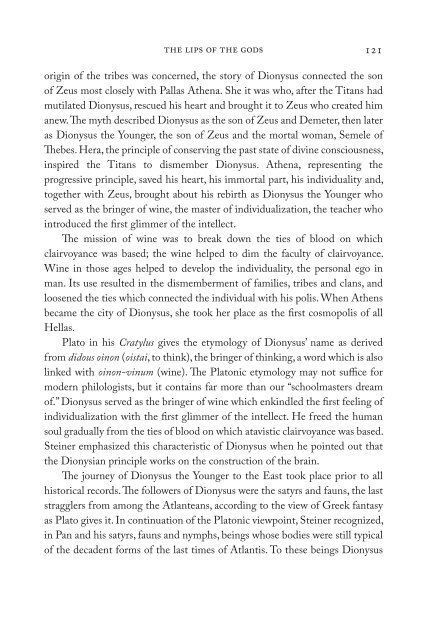The Gospel of Hellas - Research Institute for Waldorf Education
The Gospel of Hellas - Research Institute for Waldorf Education
The Gospel of Hellas - Research Institute for Waldorf Education
You also want an ePaper? Increase the reach of your titles
YUMPU automatically turns print PDFs into web optimized ePapers that Google loves.
the lips <strong>of</strong> the gods<br />
origin <strong>of</strong> the tribes was concerned, the story <strong>of</strong> Dionysus connected the son<br />
<strong>of</strong> Zeus most closely with Pallas Athena. She it was who, after the Titans had<br />
mutilated Dionysus, rescued his heart and brought it to Zeus who created him<br />
anew. <strong>The</strong> myth described Dionysus as the son <strong>of</strong> Zeus and Demeter, then later<br />
as Dionysus the Younger, the son <strong>of</strong> Zeus and the mortal woman, Semele <strong>of</strong><br />
<strong>The</strong>bes. Hera, the principle <strong>of</strong> conserving the past state <strong>of</strong> divine consciousness,<br />
inspired the Titans to dismember Dionysus. Athena, representing the<br />
progressive principle, saved his heart, his immortal part, his individuality and,<br />
together with Zeus, brought about his rebirth as Dionysus the Younger who<br />
served as the bringer <strong>of</strong> wine, the master <strong>of</strong> individualization, the teacher who<br />
introduced the first glimmer <strong>of</strong> the intellect.<br />
<strong>The</strong> mission <strong>of</strong> wine was to break down the ties <strong>of</strong> blood on which<br />
clairvoyance was based; the wine helped to dim the faculty <strong>of</strong> clairvoyance.<br />
Wine in those ages helped to develop the individuality, the personal ego in<br />
man. Its use resulted in the dismemberment <strong>of</strong> families, tribes and clans, and<br />
loosened the ties which connected the individual with his polis. When Athens<br />
became the city <strong>of</strong> Dionysus, she took her place as the first cosmopolis <strong>of</strong> all<br />
<strong>Hellas</strong>.<br />
Plato in his Cratylus gives the etymology <strong>of</strong> Dionysus’ name as derived<br />
from didous oinon (oistai, to think), the bringer <strong>of</strong> thinking, a word which is also<br />
linked with oinon-vinum (wine). <strong>The</strong> Platonic etymology may not suffice <strong>for</strong><br />
modern philologists, but it contains far more than our “schoolmasters dream<br />
<strong>of</strong>.” Dionysus served as the bringer <strong>of</strong> wine which enkindled the first feeling <strong>of</strong><br />
individualization with the first glimmer <strong>of</strong> the intellect. He freed the human<br />
soul gradually from the ties <strong>of</strong> blood on which atavistic clairvoyance was based.<br />
Steiner emphasized this characteristic <strong>of</strong> Dionysus when he pointed out that<br />
the Dionysian principle works on the construction <strong>of</strong> the brain.<br />
<strong>The</strong> journey <strong>of</strong> Dionysus the Younger to the East took place prior to all<br />
historical records. <strong>The</strong> followers <strong>of</strong> Dionysus were the satyrs and fauns, the last<br />
stragglers from among the Atlanteans, according to the view <strong>of</strong> Greek fantasy<br />
as Plato gives it. In continuation <strong>of</strong> the Platonic viewpoint, Steiner recognized,<br />
in Pan and his satyrs, fauns and nymphs, beings whose bodies were still typical<br />
<strong>of</strong> the decadent <strong>for</strong>ms <strong>of</strong> the last times <strong>of</strong> Atlantis. To these beings Dionysus

















